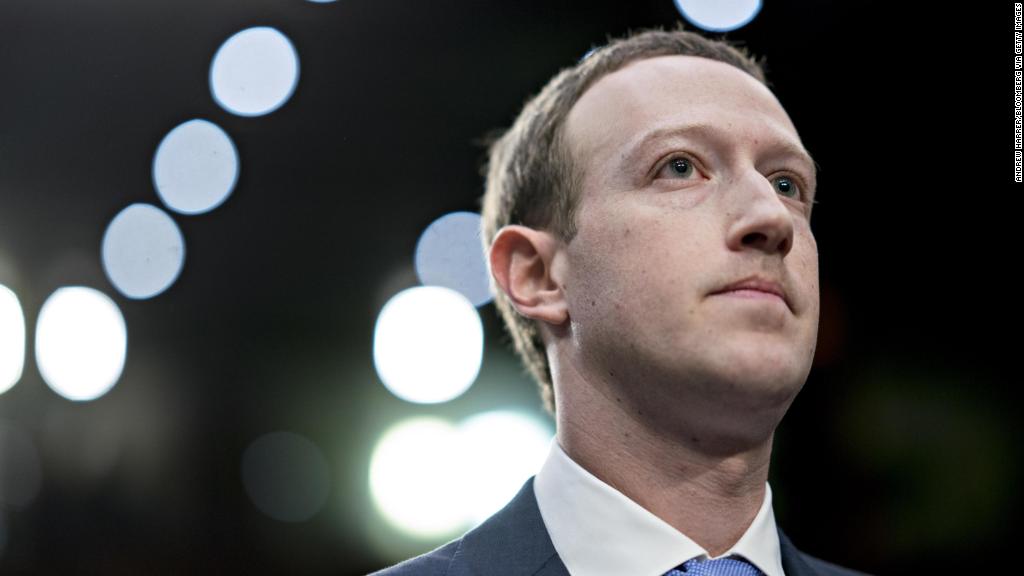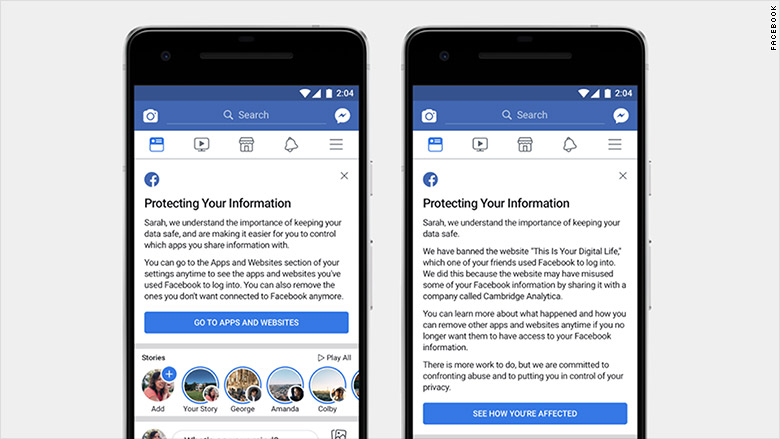
Mark Zuckerberg may have emerged unscathed from his first marathon Senate hearing, but his appearance left many questions unanswered.
For five hours on Tuesday, the Facebook CEO and founder was questioned by members of Congress on its role in allowing Cambridge Analytica, a UK-based political data firm that worked for Donald Trump's presidential campaign, to improperly access data on 87 million people. (He's before Congress again on Wednesday).
But many Facebook users still have questions about what the data scandal means, from what to do if an account is affected, to whether or not Facebook is selling user data to advertisers. We tackle questions from CNN readers below.
Want to submit a question? Send it in here. It could be featured in a future story.
How can I check if my data was compromised by Cambridge Analytica?
Users can see if their information was shared with Cambridge Analytica via a dedicated link.
Facebook is rolling out a message at the top of News Feeds to let users know if they're among those affected. Users who were not affected may see a different pop-up alert showing which apps are connected to their Facebook accounts and what data those third parties can see. The link directs users to a tool that allows them to disconnect apps from their accounts.

Why am I affected?
In 2014, about 270,000 people accessed a personality quiz from an app called This is Your Digital Life. Those who participated unknowingly shared personal information -- including birthdays, pages they've liked and in some cases, even private messages -- to Cambridge Analytica.
The process also shared the data of their Facebook friends. This means even if you didn't take the quiz, and your Facebook friend did, you're likely affected.
News of the improper collection surfaced last month.
What should I do if I was affected?
Unfortunately, there's not much users can do right now.
Facebook is directing people to its Settings page to see which apps are connected to their accounts, such as Spotify and Airbnb. Users can manually remove those apps to make sure new data isn't shared.
"[Users] will also be able to see what apps they have deleted in the past," a spokesperson said.
It's also possible to see the data Facebook has collected on them over the years. This includes old messages, poke history and which advertisers have access to your data.
To see your data profile, go to Settings > General > Download a copy of your Facebook data.
Do I have to have an active Facebook account to find out if my personal data was harvested?
Yes.
If an account was deleted, Facebook cannot verify whether that data was accessed by Cambridge Analytica, according to the social network.
If I permanently delete my account, does Facebook still have my data?
When asked by a Senator if Facebook deletes user data when someone deletes their account, Zuckerberg said yes.
But the full answer is a bit more complicated.
If you permanently delete your account, you won't be able to access any information or content you've shared in the past. However, some third-party apps may still have access to some of it.
Even when you delete your account, it can take up to 90 days for Facebook to remove the content like photos and updates stored in backup systems. But some information, such as messaging history, can still be seen by the Facebook user you wrote to even after your account was deleted.
"Copies of some material (example: log records) may remain in our database but are disassociated from personal identifiers," the company says.
But third-party apps will still have access to previously collected personal data even if a user permanently deletes their Facebook account. For example, an app that was once connected to a profile, such as Uber or Airbnb, could still have access to information like a user's friends list from 2013. The information stored depends on what access and permissions the user gives the app.
What is Facebook doing to prevent election meddling in US elections?
During his testimony on Tuesday, Zuckerberg said it's one of his "top priorities" to "get this right."
"One of my greatest regrets is we were slow in identifying the Russian operations in 2016," Zuckerberg said.
Facebook has been under fire for allowing fake news and political ads linked to the Internet Research Agency -- a St. Petersburg-based troll farm with ties to the Russian government -- to spread during the 2016 election.
Last week, the company announced it will soon label political and issue ads, and show who paid for them. Facebook will also require anyone who wants to run a political or issue ad to verify their identity and location.
In an interview with Vox, Zuckerberg pointed to Facebook's efforts during the French elections in 2017. The company developed new artificial intelligence tools to detect and delete fake accounts spreading misinformation. Meanwhile, during the special Senate election in Alabama last year, Facebook rolled out tools to target fake accounts spreading fake news.
Does Facebook sell my data to advertisers?
"We do not sell data to advertisers," Zuckerberg said during Tuesday's hearing.
However, Facebook uses information people provide — such as their age, gender and interests — to target ads to a specific audience. Advertisers tell Facebook which demographics they want to reach, and then the social media giant places the ads on related accounts.
Ads likely cost more based on how specific marketers want to get.
Although Facebook doesn't directly sell your data to outside parties, it does make money from it. The company's advertising revenue jumped 49% to $40 billion in 2017.
Why didn't Zuckerberg testify before UK lawmakers?
Facebook hasn't said why.
British lawmakers called on Zuckerberg to testify after the New York Times and UK media first reported about the Cambridge Analytica revelations.
"It is now time to hear from a senior Facebook executive with the sufficient authority to give an accurate account of this catastrophic failure of process. There is a strong public interest test regarding user protection," Damian Collins, chair of the UK parliament's media committee, wrote in a letter to Zuckerberg.
In a response to UK lawmakers, Facebook said it would make two senior executives available to testify instead, Chief Technology Officer Mike Schroepfer and Chief Product Officer Chris Cox. Both report directly to Zuckerberg.
Schroepfer is scheduled to testify on April 26 before the UK parliament's media committee.
CNN's Julia Horowitz contributed to this report.

